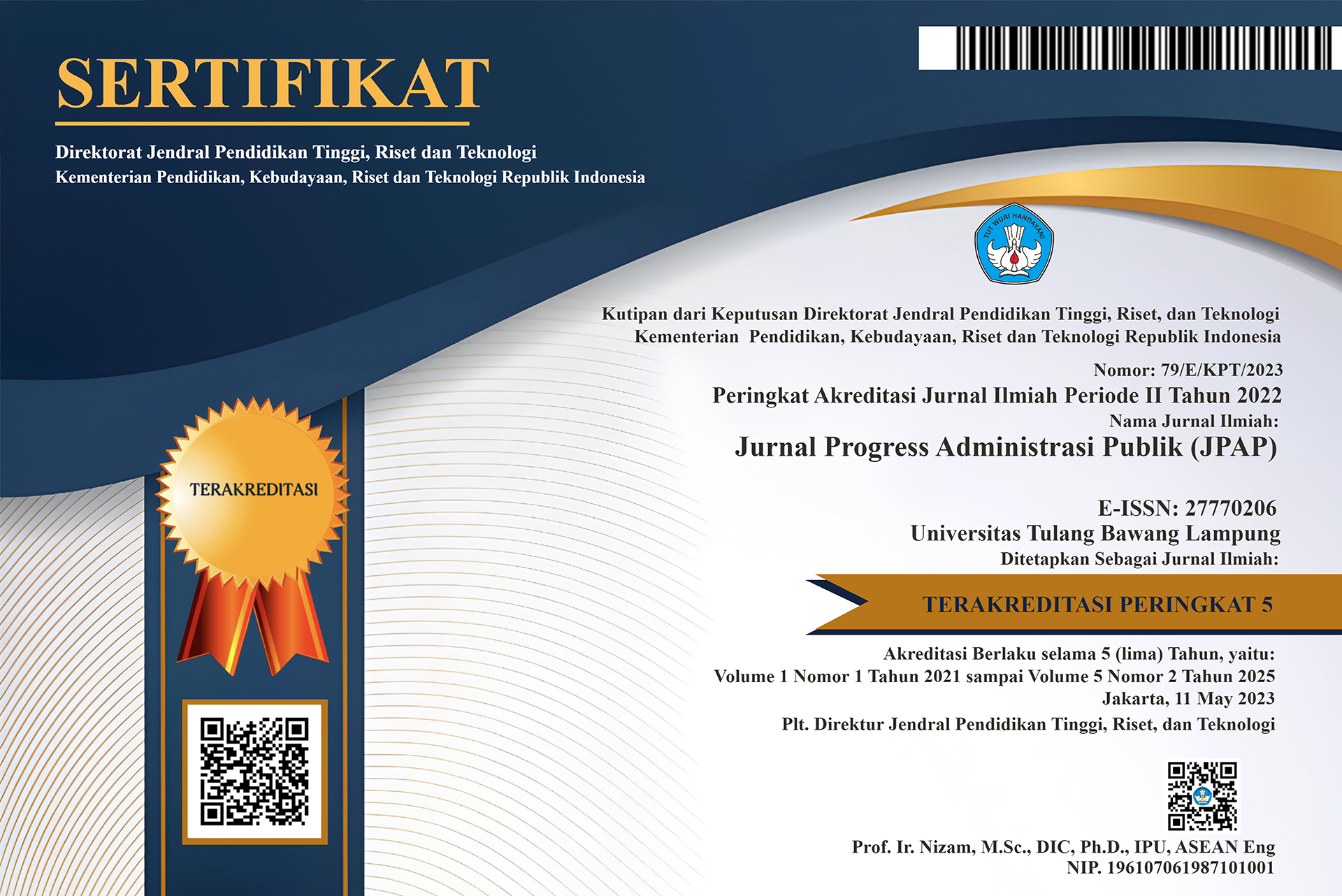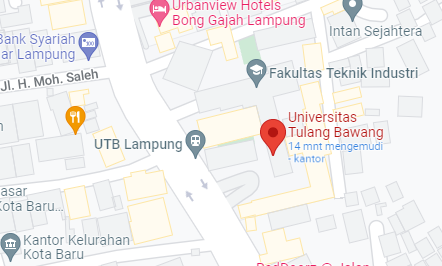PERAN KEPEMIMPINAN KEPALA SEKOLAH DALAM MENINGKATKAN KINERJA TENAGA PENDIDIK DAN TENAGA KEPENDIDIKAN DI SMP NEGERI 2 MERBAU MATARAM KABUPATEN LAMPUNG SELATAN
DOI:
https://doi.org/10.37090/jpap.v2i2.694Abstract
Education is the basic capital to create superior human resources (HR). The school is one of the alternative educational institutions. Teachers are one of the human resources (HR) in the school. The performance of teachers in schools has an important role in achieving school goals. Performance issues are in the spotlight of many parties, the government's performance will be felt by the community and the performance of teachers will be felt by students or parents. The success of school achievement is determined by various factors, including the leadership of the principal. The principal's leadership provides both mental and moral guidance for educators and education staff and also supervises, as well as records activities. Good communication will create ideas and innovations in increasing teacher work productivity and student learning outcomes. Another factor that can improve teacher performance is motivation. A teacher can work professionally if in himself there is high motivation. The Principal's leadership is a motivator for self-adherence to the teacher's work discipline. Although discipline is one part of the characteristics of teacher performance. Therefore, it is considered necessary to conduct research regarding the leadership role of the principal in improving the performance of educators and education staff. The formulation of this research problem is generally how the role of the Principal in improving the performance of educators and education staff. This research is qualitative and aims to find out how the role of the principal in improving the performance of educators and education staff. The principal acts as an educator, manager, administrator, supervisor, leader, innovator, and motivator. To achieve this role the leader must also be able to be a leader in a personal role, a leader in making decisions, and the role of the leader as a source of information. Based on the results of this study, it can be stated that the leadership role of the principal is needed in improving the performance of educators and education staff.
Keywords: Leadership, Head-Master, Teacher Performance
Downloads
References
A Tabrani R, (2000). Upaya Meningkatkan Budaya Kinerja Guru, Cianjur: CV Dinamika Karya.
Ambar Teguh Sulistiani Rosidah, (2009). Manajemen Sumber Daya Manusia, Yogyakarta: Graha Ilmu.
Arikunto Suharsimi, (1997). Prosedur Penelitian Suatu Pendekatan Praktek, Jakarta: PT Rineka Cipta.
Danim, Sudarwan, (2004). Motivasi Kepemimpinan & Efektivitas Kelompok, Jakarta: Rineka Cipta.
Davis, Keith dan John W. Newstrom, (1995). Perilaku dalam Organisasi, (Terjemahan Agus Darma), Jakarta: Erlangga.
Depdiknas Direktorat Pembinaan SMP, (2006). Pembakuan Bangunan dan Perabot SMP, Jakarta: Direktorat Pembinaan SMP.
E. Mulyasa, (2009). Menjadi Kepala Sekolah Profesional, Bandung: PT Remaja Rosdakarya.
E. Mulyasa, (2007). Menjadi Guru Profesional, Bandung : PT Remaja Rosdakarya.
Fathoni Abdurrahmat, (2006). Organisasi dan Manajemen Sumber Daya Manusia, Jakarta : PT Rineka Cipta.
Gomez Meija, D.B. Balkin dan R.L. Cardy, (2001). Managing Human Resources, USA: Prentice Hall.
Husen, Umar, (2004). Riset Sumber Daya Manusia, Jakarta: Gramedia Pustaka Utama.
Istijanto, (2005). Riset Sumber Daya Manusia, Yogyakarta : STIE YPKN
Kerlinger, Fred. N. (2004). Asas-Asas Penelitian Behavioral, Yogyakarta : Gajah Mada University Press.
Luthan, Fred, (2006). Organization Behavior (Prilaku Organisasi), Yogyakarta: ANDI.
Mangkunegara, Anwar Prabu, (2005). Manajemen Sumber Daya Manusia, Bandung : PT Remaja Rosdakarya.
Miftah Toha, (2003). Kepemimpinan dalam Manajemen, Jakarta: PT Raja Grapindo.
Nawawi, Hadari, (2005). Manajemen Sumber Daya Manusia, Yogyakarta: Gajah Mada University Press.
Peraturan Pemerintah RI, (2005). Standar Nasional Pendidikan, Jakarta : CV Eko Jaya.
Rahman at all, (2006). Peran Strategis Kepala Sekolah dalam Meningkatkan Mutu Pendidikan, Jatinangor: Alqaprint.
Rivai, Veithzal, (2004). Kepemimpinan dan Prilaku Organisasi, Jakarta: PT Raja Grafindo Persada.
Robbin Stephen P, (2001). Organizational Behavior, New Jersey: Prentice Hall International.
Sedarmayanti, (2009). Sumber Daya Manusia dan Produktivitas Kerja, Bandung: CV Mandar Maju.
Sidik Priadana, (2005). Panduan Penyusunan Skripsi dan Tesis, Bandung: STIE Pasundan.
Siagian, Sondang P. (2002). Kiat Meningkatkan Produktivitas Kerja, Jakarta: Rineka Jaya.
Siswanto, Bedjo, (2005). Manajemen Tenaga Kerja, Bandung: Sinar Baru.
Sugiyono, (2001). Metode Penelitian Administrasi, Bandung : Alfabeta.
Sujana, (2005). Metode Statistika, bandung : CV Tarsito.
Sujana, (2003). Teknik Analisis Regresi dan Korelasi, Bandung: CV Tarsito
Sukardi, (2007). Metodologi Penelitian Pendidikan, Jakarta: PT Bumi Aksara.
Supranto J. (2000). Statistik Teori dan Aplikasi, Bandung : PT Gelora Aksara.
Timple, Dale A, (2000). Seri Kepemimpinan Manajemen Sumber Daya Manusia, Jakarta: PT Elex Media Komputindo.
Wahjosumijo, (2002). Kepemimpinan Kepala Sekolah, Jakarta: PT Raja Grafindo Persada
Wibowo, (2007). Manajemen Kinerja, Jakarta: PT Raja Grapindo Persada.
Winardi, J. (2001). Pemotivasian dalam Manajemen, Jakarta: PT Raja Grapindo Persada.
Yulk Garry, (2005). Kepemimpinan dalam Organisasi, Jakarta: PT Yudeks.
Downloads
Published
Issue
Section
License
Copyright (c) 2022 Jurnal Progress Administrasi Publik (JPAP)

This work is licensed under a Creative Commons Attribution-ShareAlike 4.0 International License.























